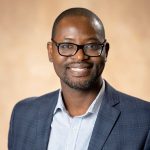
Associate professor David Ansong is collaborating on a new international initiative that aims to improve the financial capability and security of socially and financially marginalized populations in Africa and further strengthen the continent’s overall economic well-being.
The project, known as Financial Capability and Asset Building in Africa (FCAB Africa) will bring financial service providers and human-service practitioners, such as social workers, healthcare workers, counselors, and teachers, together to provide financial counseling and guidance to the individuals and families they currently serve. Perhaps most important, these frontline human-service practitioners will work to ensure that their clients have the financial knowledge and skills they need to avoid getting into debt and that they know how to identify potentially fraudulent products and services.
Such education services are critically needed, Ansong said, because of the explosive growth of financial technology and innovative platforms in Africa, or fintech, that enables many more households to access banking services, especially through mobile phone technology.
“Over the past five years, this fintech model or mobile money has expanded so significantly that no one else is seeing as much growth in financial technology as Africa is,” said Ansong, a Wallace Kuralt Early Career Scholar. “On one hand, this means that the young, old, rich, or poor all have greater access to banking services, including access to loans. However, this greater access has also brought challenges, such as excessive borrowing and really high interest rates. As a result, people are more vulnerable to fraud, and they are defaulting on their loans.
“So, although these financial platforms have been innovative in creating services that are accessible to anyone, the structure and policies that are needed to protect consumers haven’t caught up with this phase of the technology.”
Ansong and his project partners – Moses Okumu, assistant professor in the School of Social Work at the University of Illinois at Urbana-Champaign; Isaac Koomson, a research fellow at the University of New England in Australia; and the Center for Social Development at the Brown School of Social Work at Washington University in St. Louis – think FCAB can help to fill this structural gap. Major banks and financial institutions in Africa have also thrown support behind the initiative, which has numerous other partners throughout Ghana, Kenya, Liberia, and Uganda.
Having such broad support is crucial because it allows FCAB Africa to incorporate comprehensive financial education content and tailored messaging into a wide spectrum of financial services, including fintech platforms, Ansong said.
The initiative will roll out in phases, the first of which will focus on training human service practitioners to counsel and guide clients on the variety of financial services that are available and the benefits and challenges that come with each. FCAB partners eventually hope to incorporate the financial content into the curricula of universities in Africa in an effort to educate young people as early as possible, Ansong said.
Ultimately, financial wealth and capability are tied to Africa’s long-term strategies for addressing poverty, hunger, quality education, and well-being, he said. Thus, the continent needs more financially savvy households to ensure a better economy and the population’s economic success.
“If these socioeconomic indicators matter to you, then you should pay attention to financial well-being because there’s a direct link to financial capability,” Ansong said.

